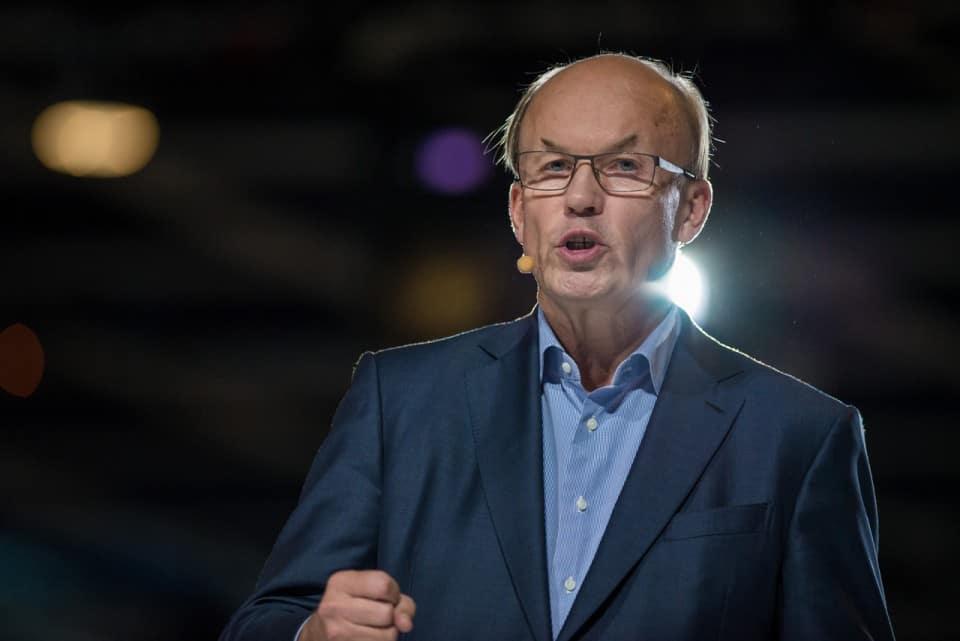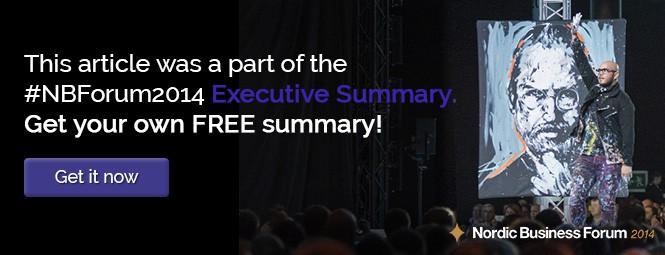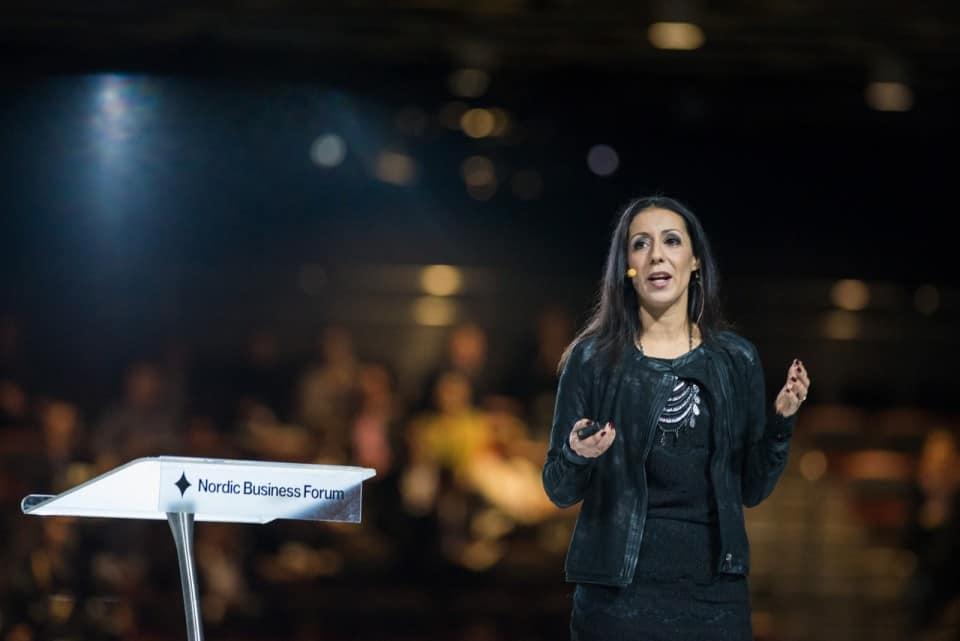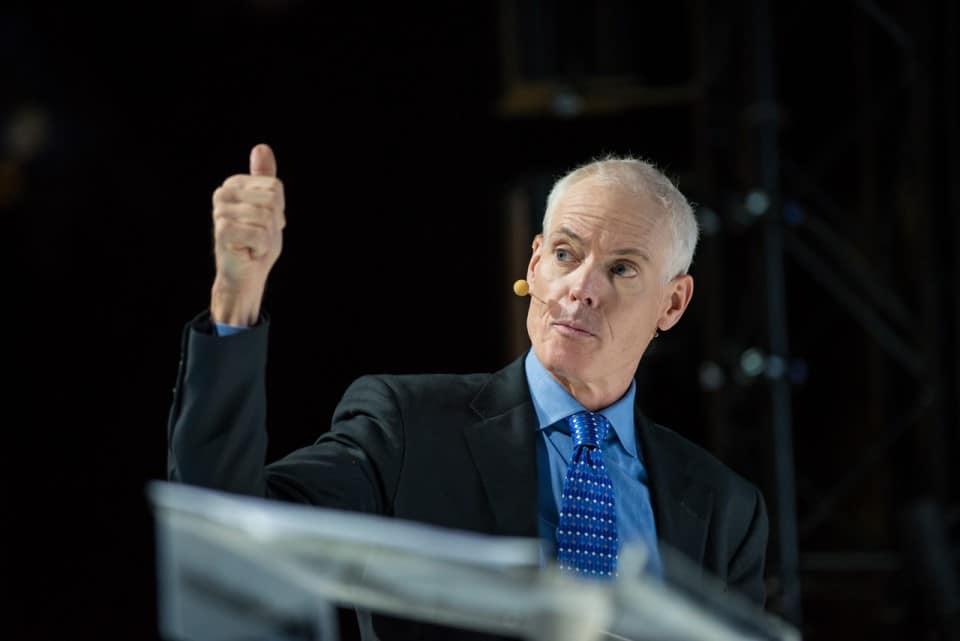2Feb2015
Matti Alahuhta, the former CEO of Kone, walks to the stage in front of 5,300 guests like he would to a meeting room with a handful of board members, “in a proper manner” one would say. Not cheering the audience nor making a big number of himself. He takes his position and takes a glance at the audience before commencing his presentation.
Alahuhta starts by asking a big question: “When can you be satisfied with your company’s development?” Is it the moment when you have reached a certain operating profit percentage? If you only look at the financial figures, at the same time your customer and employee satisfaction may have started to decline. He says that sooner or later, the declining satisfaction will lead to the situation where the company starts to decline also financially. What can you do about it? Follow your company’s development from all key dimensions.
At KONE they used five factors to follow the development: 1) Customer satisfaction, 2) Employee satisfaction, 3) Grow faster than the market, 4) Further development in finance and performance compared to competition, and 5) Strong development in sustainability. If they had succeeded in all five factors at the end of the year, they considered highly probable that they were stronger than in the beginning of the year. Not 100%, but highly probable. This kind of approach shows that they were never really 100% satisfied, but always willing to aim higher. Especially if one of the factors was not satisfying, they focused on that particular factor the following year.
The audience sits quietly and listens to Alahuhta’s presentation. Very typically Finnish by style, one would say. Once he took his square meter on the stage, he hasn’t left it yet. His tone of voice shows he is excited and proud of the story he is talking about. He gives us hard facts, moves straight forward not really trying to touch the emotions of the audience.
The culture is so important, because it sets the basis for good atmosphere and good energy level.
KONE’s five factors are not in any specific order. But, if you were asked to pick two that matter to you most, what would they be? Alahuhta was always most excited about customer and employee satisfaction. Isn’t it obvious that these two underpin the rest? Satisfied customers tend to buy more, and satisfied employees are more profitable, right?
Alahuhta’s second big question is: “What are the key factors in leadership?” Alahuhta finds building trust between people the most important. He says that in a situation where you enjoy trust, you will also have a lot of positive energy. But how can you generate trust? By listening, being open, having consistency and being straightforward. “Listening, in leading people, is clearly more important than speaking,” he says. When you listen to other people, show respect to them. “When leaders are fair, people like demanding objectives and demanding targets.”
In 2005, Alahuhta and 25 key leaders held a workshop. Its target was to understand the current situation. Although financial performance showed KONE Corporation was in good shape, certain developments worried Alahuhta. They realized that change is inevitable if they want to be the winner in the market. During the same week, they defined a strategy and major development programs. Quite an achievement for a global organization, as this kind of thing tends to take months rather than days! “Most companies have good strategies, but often they are distant from real business activities.” KONE defined five 3-year programs to make their strategy alive. Three years is long enough to see the results – but, on the other hand, it is short enough for KONE people to understand that not only every week is important, but every day as well. Top that with the monthly business review how the programs develop and you are on the right development track.
Taking the programs into practice in a 26,000 employee corporation in over 1,000 locations required a global facilitators’ network. The facilitators’ task was to ensure that every manager at KONE had a face-to-face meeting with his or her team member about the change and why it is needed and what the purpose of his or her job is and how it contributes to the development of the company. Now, if you have read and heard about Jack Welch’s management, this may sound familiar to you because he, in fact, ran the same type of project at GE.
As the next step, they restructured the management to give it more clarity. They rotated people to get the right people in the right places, and recruited nobody from the outside. By doing this KONE showed the employees that they have every reason to be proud of their past. “The more people you have in jobs they are interested in, and where they have the probability to grow, the more power you have in the company,” says Alahuhta. Well said.
In December 2005 it was time to define values for KONE. At the time, the company had a good and healthy culture. Alahuhta emphasizes the importance of company culture a lot during his presentation: “The culture is so important, because it sets the basis for a good atmosphere and good energy level.” Culture itself can be developed by defining values and developing the values in the company. Everywhere, all the time. Values have to be simple, they have to have clarity, be inspirational – and most of all, they have to be easy to remember. How many of us remember the company values when asked? Gotcha!
In addition to values, a company needs a vision. Alahuhta says that, “Like values, a vision needs to have clarity, be inspirational, easy to remember and it has to empower people.” A traditional KONE-like company would probably have a vision like, “We make world’s best elevators,” where modern KONE has a vision, “We deliver the best people flow experience.” There’s a huge difference between these two. One involves people, and the other one is, well, just technical stuff.
Every now and then, after Alahuhta gives the audience something to think about, he pauses. Waits for the reactions. Takes a sip of water and continues. In my opinion, his presentation style is very welcome. Finns in general love this kind of an approach.
In 2008 KONE started the second set of the five development programs. Again, their purpose was to bring KONE closer towards their vision. There were important areas that were continuously developed, not only during the three-year programs. After some years of development Alahuhta realized one very important thing: “The more advanced the company becomes, the more you see possibilities for further development.”
Like many successful leaders, Alahuhta speaks about the importance of people for a company’s business. He mentions diversity as an asset. Have young, have experienced people. Male and female. People with different working history and different cultural background. That helps the people to see the complex environment and complex problems from different angles and create simple solutions for the problems.
It seems that when bad times are ahead, many companies start to hold back the operations and lay people off. What KONE did was quite extraordinary. They started to invest heavily in people’s leadership skills. Why? Alahuhta sees the bad times as an opportunity to develop business faster compared to competitors, if people are motivated. Bad times for business are good time for developing people.
Alahuhta ends his presentation with a great advice for any leader: “Set the direction. Work very, very hard in order to engage everyone. Thank you.” The 5,300 guests reward him with a standing ovation.
Key points from the session:
- Set a clear direction to your company. Take care that all the people understand how they can contribute to the development of the company towards its objectives.
- Build trust between people. Listen, be open, consistent and straightforward. When people see that the leaders are fair, they are willing to take demanding objectives. Demanding targets inspire people.
- Focus on company culture. It sets the basis for a good atmosphere and good energy levels. You can develop the culture by defining values and further developing these values in your company.
The former CEO of Kone and also a former member of the NOKIA “Dream Team”. KONE is ranked by Forbes as one of the world’s most innovative companies. In 2009, European Business Press recognized Alahuhta as The Business Leader of Europe.



